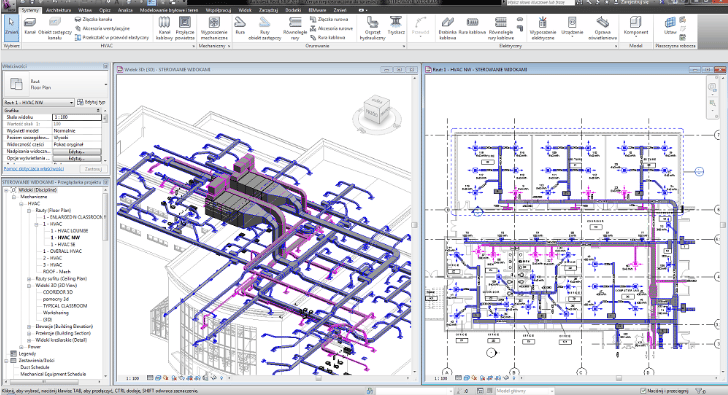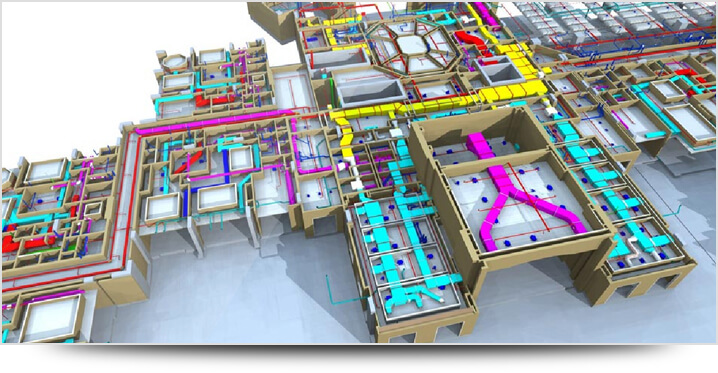.png)
In modern construction, MEP coordination tools have become essential for integrating mechanical, electrical, and plumbing systems efficiently. According to the U.S. Census Bureau’s July 2026 construction report, total construction spending reached $2.14 trillion, reflecting the industry’s rapid growth and increasing project complexity. This expansion underscores the demand for smarter coordination technologies that improve precision and collaboration across disciplines.
Autodesk Navisworks and the BIM platform stand out among leading solutions, offering strong visualization, real-time collaboration, and model integration features. These construction solutions enhance project collaboration and streamline every stage of MEP engineering, ensuring that design, coordination, and construction teams work cohesively to deliver efficient and error-free outcomes. For those exploring advanced workflows in BIM for MEP engineers, both platforms offer scalable solutions that adapt to complex design environments.
Why MEP Coordination Tools are critical in construction projects?

Effective MEP coordination tools ensure harmony between building systems, minimizing conflicts that lead to costly rework. For every MEP engineer, coordination software bridges the gap between digital modeling and on-site execution, improving project predictability and communication.
Key benefits include:
-
Seamless integration across disciplines using BIM-based MEP tools and MEP software.
-
Improved accuracy through automated clash detection software.
-
Stronger project collaboration supported by cloud data sharing.
-
Better productivity from structured MEP workflow management.
-
Support for sustainable design through innovative digital construction solutions.
When used properly, these construction coordination tools simplify complex processes, reduce data errors, and align multidisciplinary teams.
Key features of Autodesk Navisworks for MEP coordination
Autodesk Navisworks is one of the most recognized MEP coordination tools, trusted for visualization, review, and clash management. It helps teams visualize building systems in a unified environment, enabling faster problem detection and resolution before construction begins.
Key features include:
-
An advanced clash detection tool that identifies system conflicts early.
-
Integration with multiple mep software formats, enabling combined model viewing.
-
Support for MEP workflow management and efficient review processes.
-
Compatibility with BIM-based MEP tools and Revit for model aggregation.
-
Simulation and quantification capabilities for real-time design validation.
Navisworks allows professionals to understand how MEP engineers manage clashes with BIM software, fostering collaboration across disciplines. Merging visual and analytical capabilities helps MEP engineers coordinate installations with accuracy.
These features not only aid coordination but also support reducing errors with Navisworks and BIM 360 in MEP design, improving design-to-field consistency. When paired with engineering collaboration software, Navisworks helps construction teams verify spatial alignment, review constructability, and communicate design intent effectively.
Also Read: Top 50 MEP Interview Questions & Answers 2026
Key features of BIM 360 for MEP Coordination

The BIM 360 platform brings cloud collaboration to the forefront of mep engineering, providing real-time coordination across distributed teams. It allows every mep engineer to monitor updates instantly, reducing delays and ensuring version accuracy.
Main features include:
-
Centralized data management for seamless MEP project collaboration.
-
Integration of models and design data from multiple disciplines.
-
Effective issue tracking and automated MEP workflow management.
-
Real-time accessibility through mobile and desktop interfaces.
-
Efficient integration of BIM 360 with mechanical, electrical, and plumbing systems.
BIM plays a central role in digital collaboration strategies using Navisworks and BIM 360, ensuring design data is always accessible. This integration promotes transparency, streamlines communication, and facilitates MEP project collaboration tips using BIM software for multi-stakeholder coordination.
By serving as a unified digital workspace, it also strengthens engineering collaboration software adoption and ensures tools for optimizing MEP workflows and coordination operate smoothly throughout all stages of project execution.
Pros and Cons: Navisworks vs. BIM 360 for MEP engineers
Navisworks and BIM 360 are both widely used MEP coordination tools, each offering distinct benefits for engineers managing design integration and collaboration. The table below clearly compares their main advantages and limitations.
|
Feature |
Navisworks |
BIM 360 |
|
Core Strength |
Advanced clash detection and visualization for precise coordination. |
Real-time cloud collaboration for connected project teams. |
|
Visualization & Analysis |
Powerful 3D navigation and simulation tools for detailed model reviews. |
Centralized access to models and data through a web-based interface. |
|
Collaboration |
Ideal for offline work; collaboration requires manual updates. |
Streamlined document control and live model sharing across disciplines. |
|
Integration |
Compatible with multiple MEP and BIM file formats for multidisciplinary coordination. |
Integrates smoothly with Revit and other BIM-based tools for design iteration. |
|
Accessibility |
Works efficiently on local systems with no constant internet dependency. |
Requires stable internet connectivity; best for remote or distributed teams. |
|
Limitation |
Lacks built-in real-time cloud sharing and requires manual syncing. |
Slightly less advanced in visual clash detection compared to Navisworks. |
Together, Navisworks and BIM 360 complement each other, Navisworks offering detailed model analysis and BIM 360 enabling seamless team collaboration. Many engineering teams use both tools to balance precision and connectivity for smoother, more efficient coordination workflows.
Also Read: BIM for MEP: A Complete Guide 2026
How BIM integration enhances coordination and clash detection
Integrating BIM workflows with MEP coordination tools drives efficiency across the entire project lifecycle. It connects models, teams, and real-time data for better collaboration and faster problem-solving.
Integration benefits include:
-
Improved MEP project collaboration through shared, cloud-based environments.
-
Enhanced visibility using integrated clash detection tools.
-
Streamlined workflows through engineering collaboration software.
-
Simplified task tracking in MEP workflows management systems.
-
Data-driven digital construction solutions that promote accuracy.
The integration of BIM 360 with mechanical, electrical, and plumbing systems ensures that changes in design are reflected across all disciplines. By combining Navisworks’ visualization and BIM 360’s collaboration features, teams experience reducing errors with Navisworks and BIM 360 in MEP design while maintaining full traceability. This approach creates a holistic view of engineering, ensuring sustainable, data-driven decisions across all stages of construction.
Conclusion
Both Navisworks and BIM 360 are indispensable MEP coordination tools that redefine how complex construction systems are managed. Navisworks provides precision through simulation and clash analysis, while the BIM 360 platform enhances collaboration and accessibility. Together, they deliver digital construction solutions that promote productivity, transparency, and efficiency in engineering.
To build the skills needed to work confidently with these tools and understand how computational design transforms modern MEP workflows, explore the BIM Course for MEP Engineers offered by Novatr, which bridges engineering and technology, preparing professionals for the evolving future of digital construction.
Visit our resource page to learn more and access industry insights that support your upskilling journey.
FAQs
1. How does Navisworks help in detecting clashes and improving collaboration?
Ans: Navisworks enhances coordination with advanced clash detection software, helping engineers identify system conflicts early. Its visualization and reporting features simplify communication, improving MEP project collaboration and reducing rework across teams.
2. What features make BIM 360 effective for MEP coordination?
Ans: The BIM 360 platform allows real-time updates, central model access, and integrated workflows using collaboration software. It connects teams, promotes accurate MEP workflow management, and supports digital collaboration strategies using Navisworks and BIM 360.
3. How do Navisworks and BIM 360 differ in real-time collaboration capabilities?
Ans: Navisworks focuses on detailed clash analysis and visualization, while the BIM platform offers cloud-based sharing and teamwork. Together, they form tools for optimizing MEP workflows and coordination, ensuring both accuracy and connectivity in modern engineering projects.
Was this content helpful to you



.jpg)


.png)
